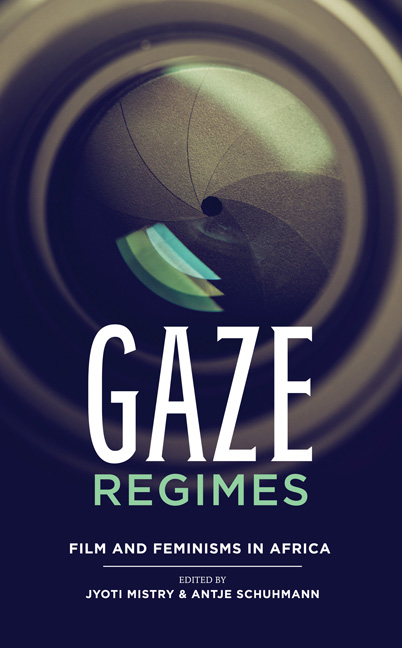Book contents
- Frontmatter
- Contents
- Acknowledgements
- Foreword: Goethe-Institut sub-Saharan Africa
- Introduction: By way of context and content
- 1 African Women in Cinema: An overview
- 2 ‘I am a feminist only in secret’
- 3 Staged Authenticity: Femininity in photography and film
- 4 ‘Power is in your own hands’: Why Jihan El-Tahri does not like movements
- 5 Aftermath – A focus on collective trauma
- 6 Shooting Violence and Trauma: Traversing visual and social topographies in Zanele Muholi's work
- 7 Puk Nini – A Filmic Instruction in Seduction: Exploring class and sexuality in gender relations
- 8 I am Saartjie Baartman
- 9 Filmmaking at the Margins of a Community: On co-producing Elelwani
- 10 On Collective Practice and Collected Reflections
- 11 ‘Cinema of resistance’
- 12 Dark and Personal
- 13 ‘Change? This might mean to shove a few men out’
- 14 Barakat! means Enough!
- 15 ‘Women, use the gaze to change reality’
- 16 Post-colonial Film Collaboration and Festival Politics
- 17 Tsitsi Dangarembga: A manifesto
- Acronyms and Abbreviations
- List of Contributors
- Filmography
- Index
17 - Tsitsi Dangarembga: A manifesto
Published online by Cambridge University Press: 20 April 2018
- Frontmatter
- Contents
- Acknowledgements
- Foreword: Goethe-Institut sub-Saharan Africa
- Introduction: By way of context and content
- 1 African Women in Cinema: An overview
- 2 ‘I am a feminist only in secret’
- 3 Staged Authenticity: Femininity in photography and film
- 4 ‘Power is in your own hands’: Why Jihan El-Tahri does not like movements
- 5 Aftermath – A focus on collective trauma
- 6 Shooting Violence and Trauma: Traversing visual and social topographies in Zanele Muholi's work
- 7 Puk Nini – A Filmic Instruction in Seduction: Exploring class and sexuality in gender relations
- 8 I am Saartjie Baartman
- 9 Filmmaking at the Margins of a Community: On co-producing Elelwani
- 10 On Collective Practice and Collected Reflections
- 11 ‘Cinema of resistance’
- 12 Dark and Personal
- 13 ‘Change? This might mean to shove a few men out’
- 14 Barakat! means Enough!
- 15 ‘Women, use the gaze to change reality’
- 16 Post-colonial Film Collaboration and Festival Politics
- 17 Tsitsi Dangarembga: A manifesto
- Acronyms and Abbreviations
- List of Contributors
- Filmography
- Index
Summary
Tsitsi Dangarembga was born in Zimbabwe and is the author of the critically acclaimed novel Nervous Conditions (1988). As a filmmaker and activist she is invested in the ‘capacity building’ of young female visual artists. She recognised the opportunity present in the gathering of an influential group of women at the Goethe-Institut ‘ARTSWork: Meeting of African Women Filmmakers’ conference in 2010, and used the context of the conference to draft a preliminary Manifesto of African Women Filmmakers, the initial workings of which are outlined below. Inspired by the undertakings of the manifesto, the accompanying interview offers a contextual description of the immediate experiences, observations and rationale for how filmmaking for women in Zimbabwe has evolved. Even more significantly, Dangarembga addresses the complexity of the gendered experience for filmmakers on the continent.
MANIFESTO OF AFRICAN WOMEN FILMMAKERS
Having met at the Goethe-Institut Johannesburg, at the Conference of African Women Filmmakers held from 2 to 5 September 2010;
Having deliberated on the continued misrepresentation and under-representation of women in general, and in particular of African women in all their diversity worldwide in the moving images media;
Recognising our exclusion as a group from a fair share of the resources of all natures that constitute the means of representation in the medium of moving images in all its forms;
Recognising that the media represent a social voice and position of authority so that which appears in the media is socially empowered and that which does not appear in the media is socially disadvantaged, with the result that mainstream moving images media works to continue the subjugation of women, and particularly of African women;
Acknowledging the platform availed to us by the Goethe-Institut, Johannesburg, this meeting of African Women Film Practitioners requests all national cultural ministries and all national public and private broadcasters on the continent, and the Commission of Culture in the African Union to take appropriate steps, in conjunction with representative structures of African Women Film practitioners (such as UPAFI – Pan African Women in Film – and its affiliated membership bodies), as well as regional bodies (such as Women Filmmakers of Zimbabwe) to hold consultations aimed at putting into place mechanisms to implement, with critical and urgent considerations, this manifesto.
- Type
- Chapter
- Information
- Gaze RegimesFilm and feminisms in Africa, pp. 201 - 211Publisher: Wits University PressPrint publication year: 2015



